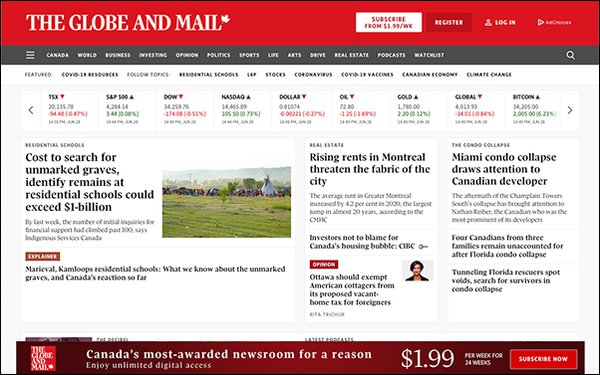
Consumers often go to a site to read an article and are
promptly told that they must pay to continue. So they leave and the publisher loses a potential ad impression because an inability to distinguish between types of readers.
Canada’s Globe and Mail is offering a tool that can determine whether to present a paywall. Sophi, a technology developed in-house, uses deep-learning technology to automate that and
other publishing decisions, according to a session at the Online News Association conference, as reported by NiemanLab.
This is not a new idea, but more publishers might
consider it, given the ubiquity of paywalls and the desperate need to reach readers.
The Globe and Mail itself “has no evenly applied
article limit,” Nieman notes. “Some readers might never encounter a paywall.”
advertisement
advertisement
The result? The paper has seen subscription conversions increase by 51% and email
registrations more than double. And, it credits Sophi with helping it generate 170,000 digital-only subscriptions.
Moreover, the paper claims that Sophi has been adopted by over 50
outlets run by 11 publishers, per Nieman.
The Sophi site offers “Automation and Predictive Paywalls for Modern Publishers.”
Here’s the value
proposition:
“Take the guesswork out of identifying subscriber-only stories with best-in-class user- and content-propensity modelling and targeting,” the site urges
publishers. “You’ll finally understand which stories users will pay to access, and which stories deliver more value through advertising revenue.”
How would this
work?
A reader of general news might be less likely to subscribe to a certain product than a business reader. Sophi can determine this and pivot to offer an email registration to that
general reader, instead of hitting them with “the same message again and again,” moving forward.
Geography is another variable, although it’s not cited here: Should a
casual Boston-based browser be hit with a paywall when trying to read an article in a Chicago periodical?
At the Globe & Mail, editors have the ability to override the
algorithm in the interest of public good. For instance, they eliminated paywalls when wildfires were raging in Western Canada.
Here’s one consideration:
one-size-fits-all paywall demands can aggravate readers. And they may never return, no matter what the story.